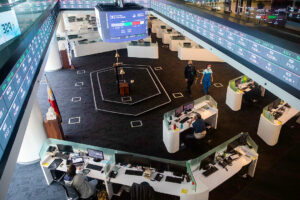By Revin Mikhael D. Ochave, Reporter
THE Philippine Stock Exchange, Inc. (PSE) is increasing its capital-raising target this year to P170 billion from P120 billion and from P82.4 billion in actual capital raised last year, amid an easing trade war between the world’s two biggest economies that had fed fears of a global recession.
The new goal is based on capital-raising activities that have been applied for and does not yet take into account GCash’s planned initial public offering (IPO), PSE President and Chief Executive Officer Ramon S. Monzon told a virtual news briefing last week.
“We expect this year to be a very high capital-raising year, a very successful year for PSE,” he added.
Mr. Monzon said capital raised at the PSE had reached P42.42 billion as of May 14.
Some of the big IPOs expected include those from west zone water concessionaire Maynilad Water Services, Inc. and mobile wallet operator GCash.
“I’m really looking at IPOs, follow-on offerings, stock rights offerings and private placements because after all, the exchange is the platform where companies are supposed to raise capital,” the PSE chief said.
Mr. Monzon hinted that GCash might end up proceeding with its IPO later this year but said it had not yet applied.
“GCash has been talking to us,” he said. “While there has been no formal application yet, I know they are preparing to do an IPO later this year.”
“As to the actual timing, we don’t know when it will be. There are some issues that they are trying to resolve, mainly the valuation and determining what size of IPO they should have that can be absorbed by the market,” he added.
Globe Telecom, Inc., which has a 36% stake in Globe Fintech Innovations, Inc. (Mynt), which owns GCash operator G-Xchange, Inc., last month said its IPO for the e-wallet would proceed, but the timing remained uncertain due to market volatility caused by US tariffs.
The US and China last week announced a 90-day pause on most of their recent tariffs on each other, fueling hopes of a cooldown in their trade war.
The combined US duties on Chinese imports will be cut to 30% from 145%, while China’s levies on US imports will fall to 10% from 125%.
But some analysts have noted that tariffs remain far higher than before Mr. Trump regained office, suggesting that prices of many consumer goods — from cars and food to clothing — would still go up.
Maynilad is targeting a July 17 listing for its P45.8-billion IPO, based on its latest prospectus dated May 14. It is required to offer at least 30% of its outstanding capital stock to the public by January 2027 under its legislative franchise.
Jarrod Leighton M. Tin, an equity research analyst at DragonFi Securities, Inc., thinks the PSE’s capital-raising target this year is attainable.
“It is achievable since Maynilad is required by law to list on the PSE,” he said in a Viber message. “The stock right offerings and follow-on offerings should be straightforward.”
“Now is a better time to conduct IPOs since the US markets have bottomed out with the de-escalation of the trade war,” he added.
Michael L. Ricafort, chief economist at Rizal Commercial Banking Corp., also cited better stock market conditions locally and in the US.
“It follows that more fund-raising is possible locally, as companies that will sell shares will be able to sell at a higher price and maximize the proceeds that they would be able to raise,” he said in a Viber message.
PDS INTERESTMeanwhile, Mr. Monzon said the PSE is seeking to increase its stake in the Philippine Dealing System Holdings Corp. (PDS) to as much as 97% as the market operator awaits developments on three government banks that are selling their interest.
“We’re talking to three government institutions that still own shares in PDS,” he said, referring to Development Bank of the Philippines with 3%, Land Bank of the Philippines with more than 2.5% and Philippine Deposit Insurance Corp. with less than 1%.
“It’s taking a long time for us to acquire this because being government banks, they’re subject to certain rules before they can dispose of their investments,” the PSE chief said. “Right now, they’re trying to get an exemption to go into another public bidding before they can sell to PSE.”
Last week, the PSE increased its beneficial ownership stake in PDS to 91.6% after it closed accession deals for the 17,500 PDS shares held by two members of the Bankers Association of the Philippines (BAP) equivalent to a 0.28% stake.
The PDS operates the Philippine Dealing and Exchange Corp. (PDEx), Philippine Depository and Trust Corp. and Philippine Securities Settlement Corp.
After the market operator’s acquisition of PDS, Mr. Monzon said the PSE had agreed to sell part of its ownership in bond trading platform PDEx to BAP.
“After some serious negotiations, we finally reached an agreement that PSE would be willing to sell part of the PDEx ownership to BAP, but PSE would remain in control at 51%,” he said.
“It’s the banks that do a lot of the trading and generate the revenues for PDEx,” he pointed out. “You want to have them as a partner, not as an adversary.”
“Being the primary stakeholders of the fixed-income market, I think they would be very helpful in coming up with new products that they could trade and offer to their clients,” he added.
In December, the PSE reached a P2.32-billion deal to acquire a 61.92% stake in PDS. The deal involved the acquisition of 3.87 million shares at P600 each.
On Friday, the bellwether PSE index shed 0.02% or 1.33 points to 6,465.53, while the broader all-share index added 0.02% or 0.93 point to 3,769.37.
